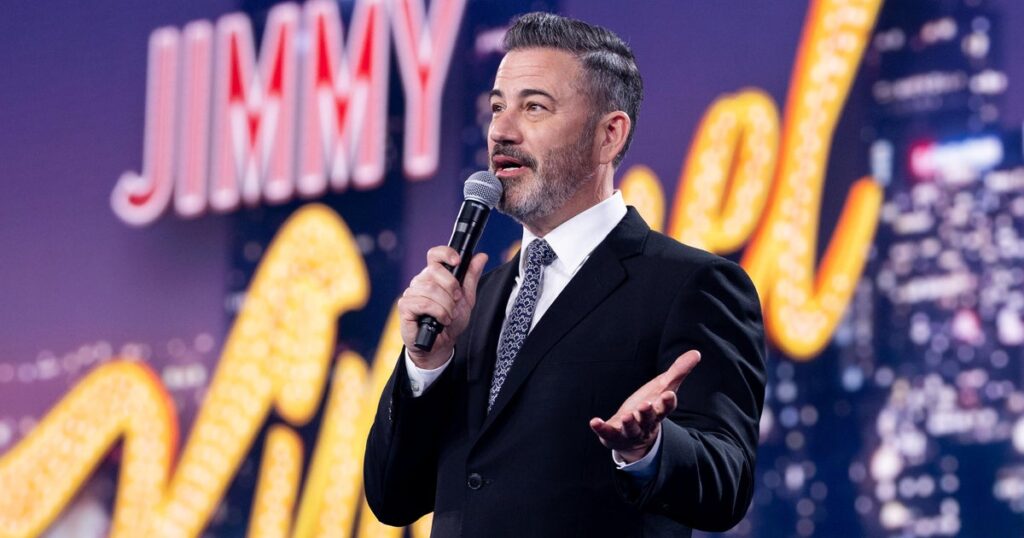Former Disney CEO Michael Eisner voiced his support for late-night host Jimmy Kimmel, following the indefinite suspension from his show, “Jimmy Kimmel Live!” by the Disney-owned ABC network. Eisner criticized the network’s decision as a capitulation to “out-of-control intimidation” surrounding recent political statements made by Kimmel regarding the tragic killing of conservative activist Charlie Kirk. The incident has ignited a broader discussion on freedom of speech and the consequences of public statements in today’s politically charged environment.
| Article Subheadings |
|---|
| 1) Background on Jimmy Kimmel’s Suspension |
| 2) Michael Eisner’s Defense of Kimmel |
| 3) Reaction from the Federal Communications Commission |
| 4) Broader Implications for Free Speech |
| 5) Conclusion and Future Consequences |
Background on Jimmy Kimmel’s Suspension
On October 10, 2023, ABC announced it had suspended Jimmy Kimmel indefinitely following his controversial comments regarding the assassination of Charlie Kirk, a prominent conservative activist. Kimmel’s remarks suggested that political allies of former President Donald Trump were attempting to exploit Kirk’s death for their own gain, a statement that ignited further division among political commentators. Kimmel’s show, which has been a staple of late-night television since its launch in 2003, has frequently tackled politically charged topics, but this particular incident became a flashpoint for discussions about the potential repercussions of speaking freely in a polarized society.
Michael Eisner’s Defense of Kimmel
In a strong rebuke of ABC’s decision, Michael Eisner publicly defended Kimmel through a post on social media platform X. He questioned the leadership within corporate structures that yield to “bullies” and called the suspension an example of intimidation tactics being used against free speech. “Where has all the leadership gone? If not for university presidents, law firm managing partners, and corporate chief executives standing up against bullies, who then will step up for the First Amendment?” he stated. Eisner made it clear that he believes Kimmel’s talent and humor should not subject him to such punitive measures, adding his disapproval of the growing trend of sanctioning individuals based on their political expressions.
Reaction from the Federal Communications Commission
The situation escalated as Brendan Carr, the Chair of the Federal Communications Commission (FCC), criticized Kimmel’s statements, dubbing them “some of the sickest conduct possible.” Carr indicated that Kimmel might face further sanctions from ABC due to the FCC’s ongoing scrutiny of media ethics related to political commentary. This reflects a larger trend where governmental scrutiny intersects with media practices, raising concerns about how regulatory bodies might influence the content that networks choose to air. The sheer nature of Kimmel’s comments placed him at the center of a political storm, igniting discussions on the media’s responsibility to reflect a balanced view in such a fractured political landscape.
Broader Implications for Free Speech
Eisner’s remarks regarding Kimmel resonate within broader societal discussions about free speech and the implications of political correctness. In recent years, various companies within the entertainment sector, particularly in Hollywood, have imposed penalties on individuals based on their public statements or affiliations, leading many to question whether creativity and open dialogue are being stifled. The rapid trend of public dismissals and sanctions against those who have made controversial remarks poses risks for freedom of expression within media outlets. This environment pushes individuals and organizations to consider self-censorship, fostering a chilling effect on genuine discourse concerning crucial political issues.
Conclusion and Future Consequences
As the situation unfolds, the ramifications for both Kimmel and ABC remain uncertain. The network has yet to specify if or when “Jimmy Kimmel Live!” will return to the air. The dialogue initiated by Eisner’s defense may serve as a rallying cry for advocates of free speech, emphasizing the need for corporate accountability and ethical considerations in media. While the incident highlights existing tensions within political discourse, it remains to be seen whether such incidents prompt transformative changes in broadcast norms or if they simply reinforce existing divides. As the media navigates these complex waters, Kimmel’s case could serve as a benchmark for how public figures are permitted to express their opinions without fear of corporate repercussions.
| No. | Key Points |
|---|---|
| 1 | Michael Eisner defended Jimmy Kimmel’s indefinite suspension by ABC network. |
| 2 | Kimmel’s comments related to the assassination of Charlie Kirk sparked controversy. |
| 3 | Eisner criticized corporate intimidation that stifles free speech. |
| 4 | The FCC’s Brendan Carr condemned Kimmel’s remarks and suggested potential consequences. |
| 5 | The incident raises critical questions about the implications for free speech in entertainment. |
Summary
The unfolding drama around Jimmy Kimmel’s suspension illustrates the complexities of free speech within the current media landscape. As figures like Michael Eisner raise questions about corporate accountability, the incident may spur crucial conversations about the balance between personal expression and the powerful influences of corporations today. This moment serves as a pivotal point of reflection not only for media professionals but also for society at large, as it grapples with the freedoms that characterize democratic discourse.
Frequently Asked Questions
Question: What prompted Jimmy Kimmel’s suspension from his show?
Jimmy Kimmel was suspended indefinitely by ABC following controversial comments he made regarding the assassination of conservative activist Charlie Kirk, which some perceived as politically charged and inflammatory.
Question: How did Michael Eisner respond to Kimmel’s suspension?
Michael Eisner defended Kimmel on social media, arguing that the decision to suspend him represents corporate capitulation to intimidation, and emphasized the importance of leadership in supporting free speech.
Question: What potential impacts does this incident have on free speech?
The incident raises significant concerns about free speech in the media, potentially encouraging a climate of self-censorship among individuals who fear repercussions for their public statements.
